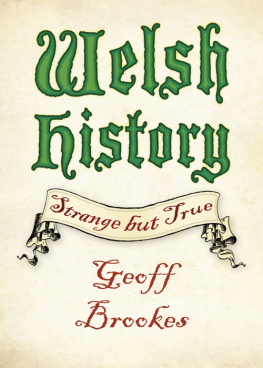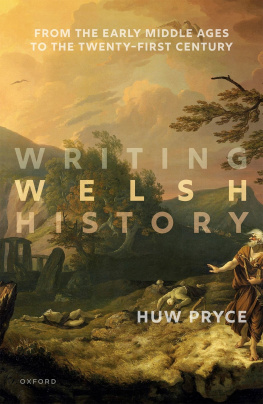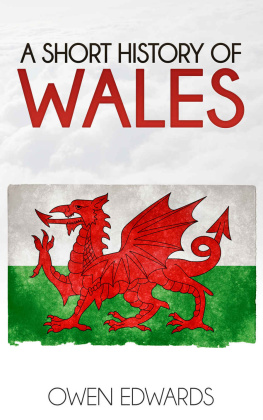Edward I's Conquest of Wales
Edward I's Conquest of Wales
Sean Davies
First published in Great Britain in 2017 by
PEN & SWORD MILITARY
An imprint of
Pen & Sword Books Ltd
47 Church Street
Barnsley
South Yorkshire
S70 2AS
Copyright Sean Davies, 2017
ISBN 978-1-47386-166-4
eISBN 978-1-47386-168-8
Mobi ISBN 978-1-47386-167-1
The right of Sean Davies to be identified as the author of this work has been asserted by him in accordance with the Copyright, Designs and Patents Act 1988.
A CIP catalogue record for this book is available from the British Library.
All rights reserved. No part of this book may be reproduced or transmitted in any form or by any means, electronic or mechanical including photocopying, recording or by any information storage and retrieval system, without permission from the Publisher in writing.
Pen & Sword Books Ltd incorporates the imprints of Pen & Sword Archaeology, Atlas, Aviation, Battleground, Discovery, Family History, History, Maritime, Military, Naval, Politics, Railways, Select, Social History, Transport, True Crime, and Claymore Press, Frontline Books, Leo Cooper, Praetorian Press, Remember When, Seaforth Publishing and Wharncliffe.
For a complete list of Pen & Sword titles please contact
PEN & SWORD BOOKS LIMITED
47 Church Street, Barnsley, South Yorkshire, S70 2AS, England
E-mail:
Website: www.pen-and-sword.co.uk
List of Plates
The view east from Aberconwy to the twin peaks of the ruined Deganwy Castle.
The castles of Dolwyddelan, Cricieth and Dolforwyn.
Two views of Caerphilly Castle.
The castles of Aberystwyth, Flint and Rhuddlan.
The view from Denbigh Castle.
Denbigh Castle.
The Menai Straits.
Bangor Cathedral.
The view over the river Wye from Builth Castle.
St Cannen Church, Llanganten.
The well in the village of Cilmeri.
The statue of Llywelyn ap Gruffudd by Henry Pegram, in Cardiff City Hall.
The monument by the well in the village of Cilmeri.
Llywelyns grave slab in Cwmhir Abbey.
Three views of Conwy Castle.
Two views of Harlech Castle.
Two views of Caernarfon Castle.
Dryslwyn Castle.
The view from Dryslwyn Castle.
Newcastle Emlyn Castle.
Beaumaris Castle.
A sixteenth-century depiction of Cadwaladr the Blessed (d. 682) in Llangadwaladr Church, Aberffraw.
Timeline
| c. 1222 | Birth of Llywelyn ap Gruffudd. |
| c. 1235 | Birth of Dafydd ap Gruffudd. |
| 1239 | Birth of Edward. |
| 1240 | Death of Llywelyn ap Iorwerth (Llywelyn the Great). |
| Accession of Dafydd ap Llywelyn. |
| 1241 | Henry IIIs successful campaign against Gwynedd. |
| 1244 | Gruffudd ap Llywelyn falls to his death from the Tower of London. Welsh rising begins in Gwynedd. |
| 1246 | Death of Dafydd ap Llywelyn. |
| 1247 | Treaty of Woodstock. |
| Perfeddwlad ceded to English rule. |
| Joint rule of the brothers Owain and Llywelyn ap Gruffudd begins in Gwynedd. |
| 1254 | Edward endowed with extensive royal lands, including those of Wales and Chester. |
| 1255 | Battle of Bryn Derwin. |
| Llywelyns sole rule of Gwynedd begins. |
| 1256 | Edward visits the Perfeddwlad. |
| Llywelyn conquers the Perfeddwlad and makes war throughout Wales. |
| 1257 | Battle of Cymerau. |
| Rift between Llywelyn and Maredudd ap Rhys Gryg. |
| Llywelyns first known attempts to secure a peace treaty with England through a financial settlement. |
| 1258 | Llywelyns first known use of the title Prince of Wales. |
| 1260 | Builth Castle destroyed by Llywelyn. |
| 1263 | Dafydd ap Gruffudd defects from his brother Llywelyn to England. Llywelyn takes and destroys the royal castles of Diserth and Deganwy. |
| 1264 | Battle of Lewes. |
| 1265 | Agreement of Pipton. |
| Battle of Evesham. |
| 1267 | Treaty of Montgomery. |
| 1270 | Edward leaves England on crusade. |
| 1272 | Death of Henry III, accession of Edward I. |
| 1273 | Llywelyn fails to perform fealty to Edwards officers. |
| Arguments over the building of the castles of Dolforwyn and Cefnllys. |
| 1274 | Edward returns to England after his crusade. |
| Dafydd ap Gruffudd and Gruffudd ap Gwenwynwyn plot to kill Llywelyn. |
| Edward cancels meeting at Shrewsbury where Llywelyn was to perform homage. |
| 1275 | Refusals by Llywelyn to travel to England to perform homage. |
| Llywelyn marries Eleanor de Montfort by proxy. |
| Eleanor captured by Edwards men on her way to Wales. |
| 1276 | Unofficial war throughout the march of Wales. |
| 1277 | Edwards first Welsh war. |
| Treaty of Aberconwy imposes humiliating terms on Llywelyn. |
| Llywelyn does homage to Edward in Westminster. |
| 1281 | Reginald de Grey appointed as Justice of Chester. |
| 1282 | Rising against English rule in Wales. |
| Edwards second Welsh war (ends in 1283). |
| Killing of Llywelyn ap Gruffudd. |
| 1283 | Dafydd ap Gruffudds capture and execution. |
| 1284 | Statute of Rhuddlan. |
| 1287 | Revolt of Rhys ap Maredudd. |
| 1290 | Death of the Maid of Norway draws Edward deeper into affairs in Scotland. |
| 1294 | War between England and France over Gascony. |
| Revolt of Madog ap Llywelyn begins in Wales. |
| 1295 | Battle of Maes Moydog. |
| Capture of Madog and the end of the revolt. |
| 1301 | Edward of Caernarfon endowed with the royal lands in Wales, becomes known as Prince of Wales. |

Chapter 1
The Red and the White Dragons
On a blustery day in 1056, King Edward the Confessor of England stared west across the river Severn, awaiting a meeting with his troublesome neighbour Gruffudd ap Llywelyn, King of Wales:
Ambassadors were sent from both sides and then they negotiated from opposite banks of the Severn, Edward being at Aust Cliff, Gruffudd at Beachley. The nobles went to and fro between them in boats, and after many exchanges of messages, the question was long debated which of them ought to cross over to the other. It was a difficult crossing owing to the roughness of the water, but that was not the ground of the dispute. Gruffudd alleged his precedence, Edward his equality: Gruffudd took the ground that his people had gained all England, with Cornwall, Scotland, and Wales, from the giants, and affirmed himself to be their heir in a direct line: Edward argued that his ancestors had got the land from its conquerors. After a great deal of quarrelsome contention Edward got in a boat and set off to Gruffudd. At that point the Severn is a mile broad. Gruffudd seeing him and recognising him cast off his state mantle for he had prepared himself for a public appearance went into the water up to his breast and throwing his arms lovingly about the boat, said: Wisest of kings, your modesty has vanquished my pride, your wisdom has triumphed over my foolishness. The neck which I foolishly stiffened against you you shall mount and so enter the territory which your mildness has today made your own. And taking him on his shoulders he seated him upon his mantle, and then with joined hands did him homage. This was an admirable beginning of peace, but, after the Welsh manner, it was only kept till they felt able to do mischief.








